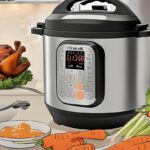If you’re looking for a healthier and flavorful alternative to beef burgers, turkey burgers are a great option! Cooking them in a cast iron skillet can enhance their flavor, but it’s important to know how long to cook them to avoid dryness or undercooking.
The optimal cooking time for turkey burgers in a cast iron skillet can vary based on several factors. The thickness of the patty, the desired level of doneness, and the heat settings can all influence the cooking time. So, how long should you cook turkey burgers in a cast iron skillet? Let’s find out!
Key Takeaways:
- Cooking time for turkey burgers in a cast iron skillet can vary based on the thickness of the patty, the desired level of doneness, and heat settings.
- Cooking turkey burgers in a cast iron skillet can enhance the flavor of the burgers.
- Knowing how long to cook turkey burgers in a cast iron skillet can prevent undercooking or overcooking, ensuring juicy and flavorful burgers every time.
Tips for Cooking Turkey Burgers in a Skillet
If you’re looking to cook delicious turkey burgers in a skillet, there are a few essential tips you need to keep in mind to achieve maximum flavor, texture, and juiciness.
Tip #1: Start with high-quality ground turkey. Look for lean or extra-lean ground turkey (at least 90% lean) to ensure that your burgers are not too greasy.
Tip #2: Season your turkey burger patties generously with salt, pepper, and any other herbs or spices you prefer. This will enhance the flavor of the turkey and add a delicious aroma to your dish.
Tip #3: Preheat your cast iron skillet over medium-high heat to ensure even heat distribution and prevent sticking. You want your skillet to be hot before adding the burgers to achieve that perfect sear.
Tip #4: Use a spatula to press down gently on the burgers after placing them in the skillet. This will help to sear the meat and prevent the burgers from puffing up.
Tip #5: Cook the burgers for about 6-8 minutes on each side, or until they reach an internal temperature of 165°F. You can use a meat thermometer to check the temperature.
Tip #6: Let the burgers rest for a few minutes before serving. This will allow the juices to redistribute and ensure maximum flavor.
With these tips, you’ll be able to cook delicious turkey burgers in your cast iron skillet and wow your friends and family with your culinary skills.
Preparing Your Cast Iron Skillet for Cooking
Before cooking your turkey burgers, it’s important to properly prepare your cast iron skillet. A well-prepared skillet ensures even heat distribution and prevents your burgers from sticking to the pan. Here are the steps to prepare your cast iron skillet:
- Season your skillet: To season your skillet, preheat your oven to 350°F. Rub a thin layer of vegetable oil over the entire surface of the skillet, including the handle. Place the skillet in the oven and bake for about an hour. Remove it from the oven and let it cool. Your skillet is now seasoned and ready for use.
- Preheat your skillet: Preheat your skillet over medium-high heat for about 5 minutes. Use an oven mitt or pot holder to handle the skillet, as the handle will be hot.
Once your skillet is seasoned and preheated, you’re ready to start cooking your turkey burgers!
Cooking Time for Turkey Burgers in a Cast Iron Skillet
When it comes to cooking turkey burgers in a cast iron skillet, the cooking time can vary depending on a few factors. The thickness of the patty, desired level of doneness, and heat settings are all important factors to consider.
As a general rule of thumb, for a 1/2 inch thick turkey burger, cook for about 3-4 minutes on each side over medium-high heat. For a thicker patty, about 1 inch thick, cook for 5-6 minutes on each side.
It’s important to note that turkey burgers should be cooked to an internal temperature of 165°F for safe consumption. Use a meat thermometer to check the internal temperature and ensure your burger is fully cooked.
Another tip for achieving perfectly cooked turkey burgers is to resist the temptation to flip them too often. Flipping your burgers too frequently can cause them to lose moisture and become dry.
It’s also important to avoid pressing down on the patties with a spatula while cooking. This can also cause the juices to escape, resulting in a dry burger.
By following these guidelines, you’ll be able to achieve delicious, juicy turkey burgers every time you cook them in your cast iron skillet.
Checking the Internal Temperature
Now that your turkey burgers are cooking in your cast iron skillet, it’s important to check their internal temperature to ensure they’re cooked to perfection. I recommend using a meat thermometer to measure the temperature of the thickest part of the patty. Insert the thermometer into the side of the burger, making sure the probe is not touching any bone or gristle.
The recommended internal temperature for turkey burgers is 165°F (75°C). Once your burgers reach this temperature, you can safely remove them from the skillet. Keep in mind that the cooking time may vary depending on the thickness of your patties, so it’s always best to double-check the temperature before serving.
Checking the internal temperature is a crucial step in ensuring that your turkey burgers are safe and delicious. Don’t skip this step!
Resting and Serving Your Turkey Burgers
Once your turkey burgers are cooked to perfection, it’s important to let them rest before serving. This allows the juices to redistribute throughout the meat, resulting in a more flavorful and moist burger.
To rest your turkey burgers, remove them from the skillet and place them on a clean plate. Cover them with aluminum foil and let them rest for about 5 minutes.
While your burgers are resting, you can prepare your favorite toppings and sides. Some great options for topping your turkey burgers include avocado, sliced cheese, lettuce, tomato, and red onion. For sides, you can’t go wrong with a fresh salad, sweet potato fries, or roasted vegetables.
When you’re ready to serve your turkey burgers, use a spatula to transfer them to your serving plates. Add your desired toppings and sides, and enjoy!
Note: If you’re making a large batch of turkey burgers, you can keep them warm in the oven while you prepare the rest of the meal. Simply place them on a baking sheet and cover them with foil. Set the oven to 200°F (93°C) and keep them in the oven until you’re ready to serve.
Conclusion
Now that you know how to cook turkey burgers in a cast iron skillet, it’s time to put your skills to the test! Remember to properly prepare your skillet by seasoning and preheating it before cooking your burgers. Be sure to follow the recommended cooking time based on factors such as patty thickness and desired level of doneness. Don’t forget to check the internal temperature with a meat thermometer and allow your burgers to rest before serving.
By employing these tips and tricks, you’ll be able to create incredibly flavorful and juicy turkey burgers that will please even the pickiest eaters. Customize your burgers with your favorite toppings and sides to make it a meal that suits your personal taste. With a little practice, you’ll become a pro at making delicious turkey burgers in no time!
FAQ
Q: How long should I cook turkey burgers in a cast iron skillet?
A: The cooking time for turkey burgers in a cast iron skillet will vary depending on several factors. Generally, it is recommended to cook them for about 4-5 minutes per side over medium heat, or until they reach an internal temperature of 165°F (74°C).
Q: What are some tips for cooking turkey burgers in a skillet?
A: Here are some tips to help you cook the perfect turkey burgers in a skillet:
– Season the burgers with your choice of spices or herbs for added flavor.
– Preheat the skillet over medium heat before adding the burgers.
– Avoid pressing down on the burgers while cooking to retain their juiciness.
– Use a meat thermometer to ensure the burgers reach the recommended safe internal temperature of 165°F (74°C).
Q: How should I prepare my cast iron skillet for cooking turkey burgers?
A: To prepare your cast iron skillet for cooking turkey burgers, follow these steps:
– Clean the skillet thoroughly with hot water and a stiff brush.
– Dry the skillet completely and apply a thin layer of vegetable oil or shortening to the cooking surface.
– Preheat the skillet over medium heat until it reaches the desired temperature before adding the burgers.
Q: How do I determine the cooking time for turkey burgers in a cast iron skillet?
A: The cooking time for turkey burgers in a cast iron skillet can vary depending on the thickness of the burgers and the desired level of doneness. As a general guideline, cook 1/2-inch thick turkey burgers for about 4-5 minutes per side over medium heat. Thicker burgers may require additional cooking time.
Q: How do I check the internal temperature of turkey burgers?
A: It is essential to check the internal temperature of turkey burgers to ensure they are safe to eat. Use a meat thermometer inserted into the thickest part of the burger to check the temperature. The recommended internal temperature for turkey burgers is 165°F (74°C).
Q: Why is it important to let turkey burgers rest before serving?
A: Allowing your turkey burgers to rest for a few minutes after cooking is crucial to ensure the juices redistribute throughout the meat, resulting in a juicier and more flavorful burger. Resting also helps the burgers retain their shape when cutting or biting into them. Serve your burgers after a short resting period for the best results.
Conclusion
Cooking turkey burgers in a cast iron skillet can be a delicious and easy way to enjoy this healthy alternative to beef burgers. By following the recommended cooking time, seasoning your burgers, checking the internal temperature, and allowing them to rest, you’ll be able to create juicy and flavorful turkey burgers that everyone will love. Experiment with different toppings and condiments to personalize your burgers and enjoy a satisfying homemade meal.
- What is a Stock Pot Used for in Cooking? - September 5, 2023
- How to Make Turkey Stock in Instant Pot - September 5, 2023
- How to Make Gravy from Pot Roast Stock - September 5, 2023






